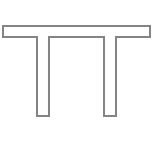Carolina Mendonça
Carolina Mendonça is interested in contamination of knowledge and in being vulnerable to different logics. Graduated in Performing Arts at ECA-USP and with Master’s in Choreography and Performance at Giessen University in Germany. Her latest projects are Pulp- History as a Warm Wet Place (2018) in Mousonturm that deals with an intuitive archeology digesting the leftovers of the XVII-XVIII centuries; useless land (2018) a night reading that invites de audience to sleep that happened in many different contexts such as MAerzmusik in Berlin, Ferme de Buisson in Paris, Beursschouwburg in Brussels and Sesta in Prague among others; We, the Undamaged others (2017) a work that puts in question happiness as an horizon that organizes our lives, premiered at Oswald de Andrade in São Paulo and showed in MIT-2018; Falling (2016) explores sleeping as a possible dance practice presented at Mousonturm.
Carolina was also one of the curator for the Performing Arts Festival VERBO (2017) at Galeria Vermelho and Temporada de Dança (2017) at Videobrasil both in São Paulo. She develops a practical theoretical research that she shares in the workshop Impossible Practices dealing with telepathy, levitation, deep listening among other practices and that was done in institutions such as Exerce in Montpellier(Fr), Tabakalera in Donostia (Esp), NIDO in Rivera (Uru), HfmdK in Frankfurt (Ger), Teerã National Theater in Teheran (Iran) among others.
Carolina build’s her work always in collaboration with other artists such as Catalina Insignares, Marcelo Evelin, Volmir Cordeiro, Dudu Quintanilha, Carolina Bianchi among others.
Practice Statement
My work is focused on embodied experiences that are dissatisfied with the limited framework of action and relation allowed by the current repertoire of contemporary hegemonic corporealities. I engage with the reinvention and imagination of anachronistic bodies, the reading of the traces of corporealities from non-Western cultures, the questioning of modern-colonial perspectives, the deployment of a political imagination and the visionary power of fictions. My artistic practices deploy empathic and imaginative capacities from which to transform together with other bodies, enabling experiences, connections and identifications that are unthinkable within the prevailing bodily frameworks.
I deal with what I call Impossible Practices that investigates telepathy, levitation, invisibility, hypnoses, among others. Impossible Practices is not interested in the virtuosity of reaching the impossible, but in what happens when we try. The question is if trying to address the impossible we might find ways of imagining other possible realities.
Expanding the boundaries of performance, workshops, collective meetings, writing, listening and readings sessions became a fertile ground to think and study collectively. In the past years, such contexts have become a very important terrain of my artistic practice.
